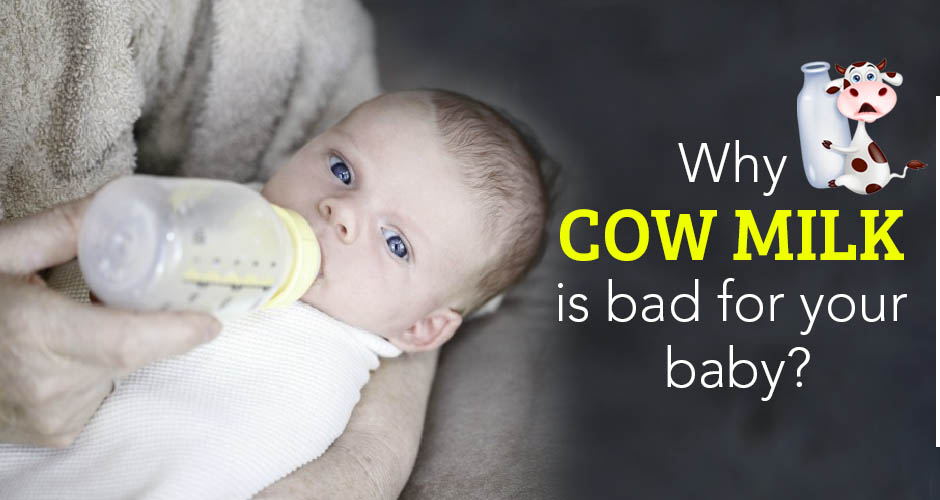
Harmful Effects of Cow's milk for babies below 1 year of age
We have often heard of benefits of cow’s milk. In fact it is often regarded as “complete food’ since it has rich content of protein, fat, carbohydrates and vitamins. Conventionally children are encouraged to drink lots of milk, with the assumption that milk is has enough nutrients that a child requires. However, what may come as a surprise to you is that doctors and researchers actually caution against feeding cow’s milk to infants below 1 year. Studies have shown that feeding cow’s milk to babies below one year of age may be the reason behind allergic diseases, including respiratory and digestive system, since they cannot tolerate protein in the milk. It has also be shown that cow’s milk may even cause iron-deficiency anemia in certain babies.
Here are a few reasons why cow’s milk is considered harmful for infants below 1 year of age:
#1. Digestion problems:
The first and foremost reason why cow’s milk is harmful for infants below 1 year of age is that the still maturing digestive system of the baby is simply not ready for the complex nature of cow’s milk. High concentrations of proteins, fats and minerals in cow’s milk makes it extremely difficult to digest for the child, while they can easily and completely digest the commercially available formula for infants.According to National family Survey figure, about three percent of children cannot tolerate milk protein in bovine milk. Cow’s milk contains a much higher concentration of protein than human breast milk, and the newborn’s developing digestive system is unable to derive enough nutrients from it.#2. Gastrointestinal irritation:
According to the American Academy of Pediatrics, the high concentration of protein and minerals present in cow’s milk can irritate the lining of the stomach, colon, and intestine of the infant, and can cause abdominal pain, as well as loss of blood through stool. The blood loss from this digestive aberration can lead to iron deficiency anemia. It has also been noted that a higher percentage of vomiting and diarrhea has been observed in infants below 1 year of age completely exposed to cow’s milk.#3. Milk allergies:
According to lactation consultants, babies given cow’s milk in their early years are more prone to milk allergies than if they are fed breastmilk or formula. The cow milk high protein content significantly increases the chance of allergic reactions, as opposed to formula, which has fewer allergenic compounds. The symptoms of milk allergy in infants may vary, often resulting in skin rash, eczema, vomiting, diarrhea, colic, wheezing or excessive weeping. Milk allergies can often have long-term ramifications on the health of the child, and in certain cases, have been known to cause even mortal danger.#4. Overnutrition:
Infants fed cow’s milk are subjected to overnutrition, ie. they receive much more proteins and minerals than they need. The extra nutrients has to be ejected through urine. The high nutrient concentration in urine leads to massive water loss. In case this is coupled with low fluid intake and/or loss of fluid because of sweat or diarrhea, it can lead to dehydration in the infant.#5. Harmful elements:
Cow’s milk contains certain elements like sodium, potassium, and chloride that are extremely harmful for a newborn baby, can damage his/her kidneys and can cause heat stress, fever, infection, and diarrhea. Bovine milk also contain high amounts of calcium, whey and casein which inhibit the absorption of dietary iron.#6. Iron deficiency:
Iron is essential in the human body, especially in infants, for the growth of red blood cells.But unprocessed cow’s milk is seriously deficient in Vitamin E, Zinc, linoleic acid, and most importantly, iron. The deficiency of iron and consequent absence of RBC-formation leads to anaemia. If left untreated, this Iron-deficiency anaemia can result to lifelong learning disabilities and delayed neural development. In about 40% of infants fed cow’s milk,loss of iron occurs through occult intestinal blood loss, but ceases once the baby is a year old.#7. Childhood Constipation:
Constipation is one of the most common problems suffered by kids these days. Studies show that removal of dairy from the diet resulted in an 80% reduction in constipation. This is because most cases of chronic constipation are caused by milk protein allergies.#8. Growth hormones:
It is only logical that the growth hormone meant for a calf wouldn’t agree with a human being. Cow’s milk has a growth-factor called IGF-1. Our body also produces its own IGF-1, so when an infant consumes cow’s milk, there’s an abnormal increase in growth and milk these days is full of pumped hormones from outside which is causing hormonal imbalances in adults as well.null
null